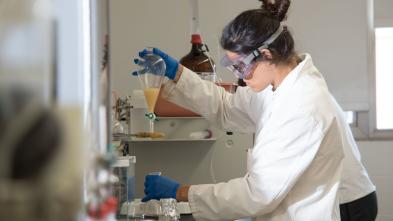

Pre-Optometry
If you're interested in becoming an optometrist, UW-Eau Claire's pre-optometry curriculum provides a pathway to graduate school for students interested in a career in optometry.
Specialized support is available to pre-optometry students through the Health Careers Center.
Develop Critical Skills
Good eyesight is an integral part of everyday living, making optometry an important element of professional health care. Optometrists examine the eye for disease and determine vision health. They are also able to write prescriptions and even identify symptoms of serious illness.
Pre-optometry is not a major at UW-Eau Claire, but rather a declaration of your intention to continue your education and become an optometrist. No specific undergraduate major is required for a career in optometry, but certain courses, skills and experiences are favored — especially when applying for graduate school. For example, health professional schools often require a high GPA, a competitive Optometry Admissions Test (OAT) score, letters of recommendation, optometrist shadowing hours, and a completed Optometry Centralized Application Service (OptomCAS) application. Science aptitude and strong communication skills are also expected.
Pre-optometry students are supported by exceptional advisors and faculty members, including the Health Careers Center who stays current on pre-optometry requirements and trends in the optometry school application process and will help you understand what it takes to develop a competitive application.
Program Details
Blugold Stories
JustThe Facts

Where can the pre-optometry program lead me after graduation?
After earning your undergraduate degree from UWEC, your next step toward becoming an optometrist is earning your doctor of optometry (OD) degree. Most UWEC students attend the Illinois College of Optometry, Midwestern University Chicago College of Optometry, or Southern College of Optometry.
Suggested pre-optometry courses at UWEC are courses that are required by most optometry schools and courses to best prepare you for the Optometry Admission Test (OAT).
Courses you can expect as a pre-optometry student include general chemistry, organic chemistry, biochemistry, introductory and advanced biology, physics, psychology, and sociology. Requirements vary by program and students should connect with the Health Careers Center and access pre health advising information early and often. Visit the Health Careers Center for a more detailed guide on pre-optometry advising.
Get More Info
Sign up to receive additional information about our campus.










